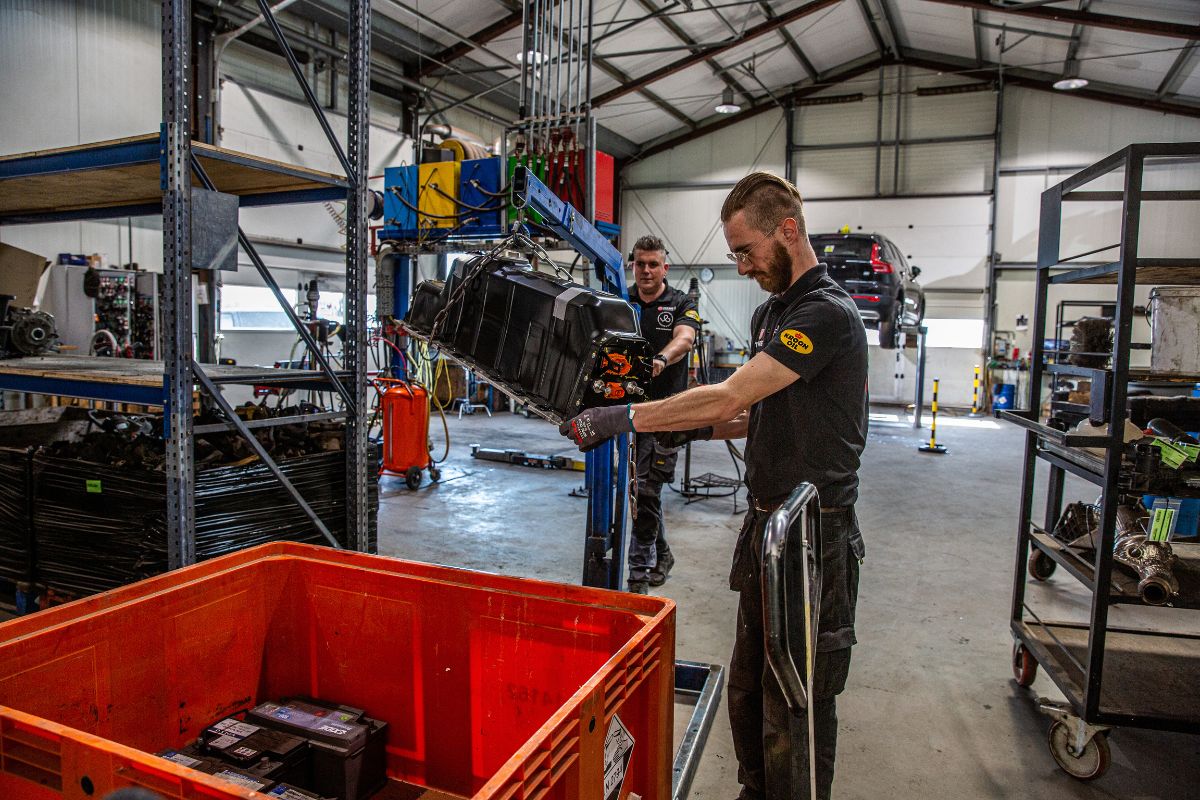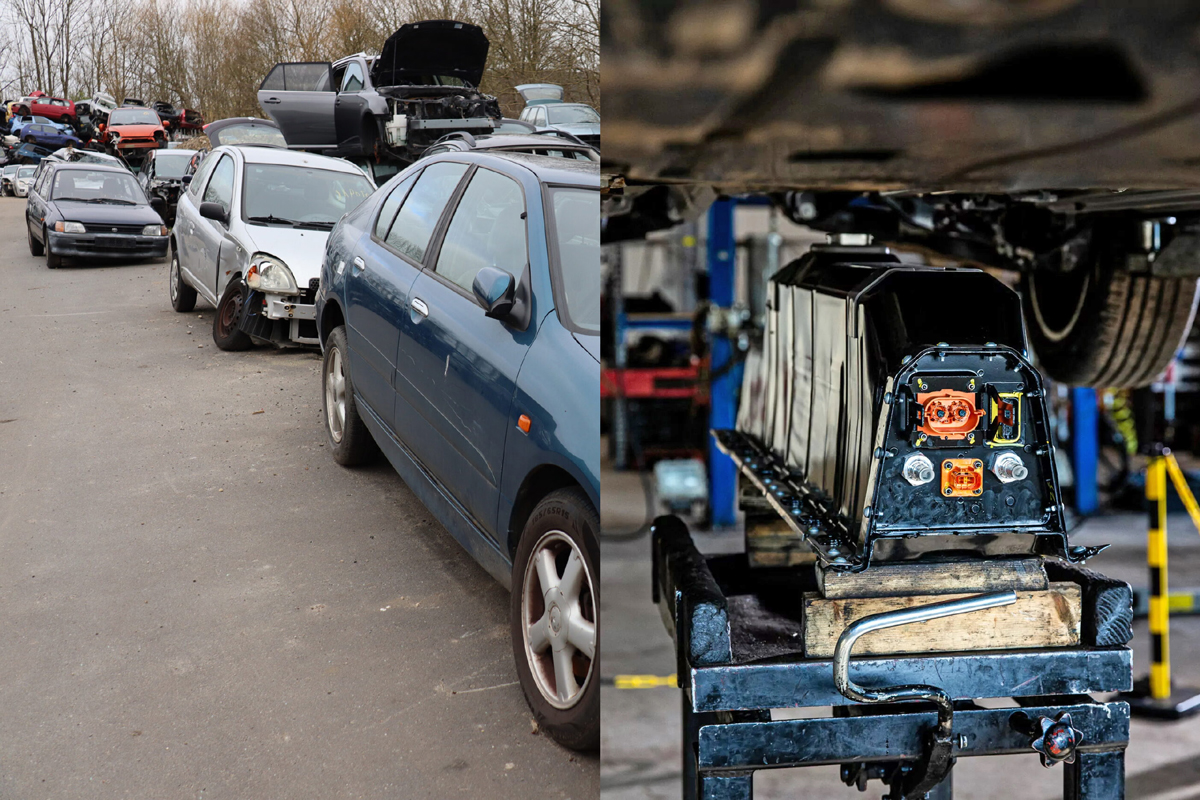The material is light, stiff and has viable end of life options. Natural fiber composites are increasingly being used in cars, such as composites that include flax. The Swiss company Bcomp plays a pioneering role and its solutions are already being used in 16 racing series around the world. The Swedish car brand Polestar (jointly owned by Volvo Cars and Geely) uses the fiber composites in the interior.
Tekst Ralph Rozema
Photo: Bcomp and Polestar
An advantage of the new materials is the reduced weight, because lighter cars can drive further with the same amount of electrical energy. “We can make car interiors 50 percent lighter. We can reduce the amount of plastic by 80 percent,” says co-founder and CEO Christian Fischer of Bcomp over the phone from Switzerland.
The Swedish car brand Polestar works closely with Bcomp. The Polestar Precept stands out, because it is a light car full of natural materials and sustainable solutions. The new Porche Cayman GT4 Clubsport also contains Bcomp’s durable fiber composites.
AmpliTex, bCores and powerRibs
The Swiss company has developed three types of materials: ampliTex flax fiber reinforcement fabrics, bCores with balsa wood (FSC certified for sustainable forestry) and then there are the powerRibs, advanced composite reinforcement grid of natural fibers. The flax comes from farms in Belgium and France and makes ampliTex a lightweight, sturdy and durable product.
Because the materials are so light yet stiff, the idea first caught on in racing. It is small-scale production where innovation is paramount. This is how Bcomp materials ended up in a racing variant of the Tesla. The Electric Production Car Series (EPCS) V2.3 Tesla P100DL was unveiled on the Barcelona racetrack in 2018. The race version was no less than 500 kg lighter compared to the road version, thanks in part to the fibers of Bcomp. The flax fiber powerRibs also sat on the roof of the race car, incorporating an innovative LCD screen that could provide information during a race.
Flax composites
The Belgian sports car brand Gillet is known for the Gillet Vertigo, which was made for the Pikes Peak International Hill Climb race in the US in 2018. The bodywork of the Gillet Vertigo is made from Bcomp’s AmpliTex and powerRibs natural fibers.
But it is the applications in cars for the general public that are really going to make a difference. The Swedish electric performance car brand Polestar, owned by Volvo Cars and Geely, was quick to respond. The interior panels have been replaced with flax composites in the Polestar Precept, launched March 2020. Other car brands are expected to incorporate the technologies. “We are in talks with various manufacturers,” says Fischer. “We notice there is a lot of interest.”
Start-up like in Silicon Valley
Bcomp’s story is reminiscent of the development of a start-up in Silicon Valley. “We started out in a small garage,” recounts CEO Christian Fischer. He is trained as a materials science engineer from the Swiss Federal Institute of Technology Lausanne EPFL and is a winter sports enthusiast. The company started out with skis, the car industry became a next step. “We were looking for ways to lighten skis and maintain the properties of the structure.”
The leisure sector turned out to be an excellent training path for the company. “We have shown that we can make stiff, light and sustainable products. That has increased our credibility and laid the foundation for working with new partners.” Following applications in motorsport, the car industry was next.
“We are not fighting carbon fiber, but where possible, natural fiber composites are a good next step. This will bring you closer to a circular system.”
Plastic waste from oceans
The company became known for some pilot projects and awards it received. For example, Bcomp’s reinforcement materials enabled the use of recycled waste plastic from the oceans in a demonstration model of the Volvo XC60. The company combined the ocean plastic with the self-designed composite powerRibs natural fibers. The future lies with more comprehensive projects. “Think of electric cars for the consumer market, from sports cars to urban mobility.”
Soybean car
Vegetable material in cars, it may sound unfamiliar, but it has been around for some time. In fact, Henri Ford already developed a prototype in 1941, the Soybean Car. There remains uncertainty about the exact composition of the car, but presumably panels made of soy-based bioplastic were reinforced with natural fibers of hemp and flax. This project was not followed up. Several car brands nowadays combine plastics with natural fibers. But high-performance composites almost entirely based on natural fibers go a step further and can significantly reduce both weight and plastic. “It manifests itself in the ecological footprint,” says Fischer. “Less CO2 emissions, viable end of life options and all in all better for the environment.”
Designed for sustainability
As car manufacturers are required to take increasing responsibility for the impact throughout the lifecycle of their cars and for recycling, there is increasing pressure to use materials that are more efficient and have a lower impact. The natural fibers are not only using renewable raw material, but also enable dematerialization – using significantly less material. Reduced weight means less fuel/energy is needed throughout the car’s life cycle.
The new composites can (partly) replace the now popular carbon fiber. Carbon fiber is light and easy to use, but difficult to recycle. “It is difficult to disassemble and process,” says Fischer. “We are not fighting carbon fiber, but where possible, natural fiber composites are a good next step. This will bring you closer to a circular system.”
Dutch link
In the Netherlands the Swiss company became known for a different project. It was a world first: a bicycle bridge (in Ritsumazijl near Leeuwarden) made of composites with flax fibers and balsa wood. State secretary Stientje van Veldhoven for Infrastructure opened the first bio-composite bridge this year.
CEO Christian Fischer especially sees a bright future for applications in the automotive industry. He notices the enthusiasm among manufacturers. Some car manufacturers have come up with their own initiatives for the use of natural or recycled fibers. Bentley experiments with “Vegea”, a vegan leather made from grape residues from wine production. Mercedes Benz uses “Dinamica” for its seats made from recycled plastic bottles and clothing fibers.
Fischer is aware of such examples. “You notice that the trend for natural composites is broadening. It is an excellent development.” Probably new competitors will enter the expanding market. “Rivalry is a good thing. The ultimate goal is that car manufacturers can work in a circular way. Natural fiber composites have tremendous potential.”




